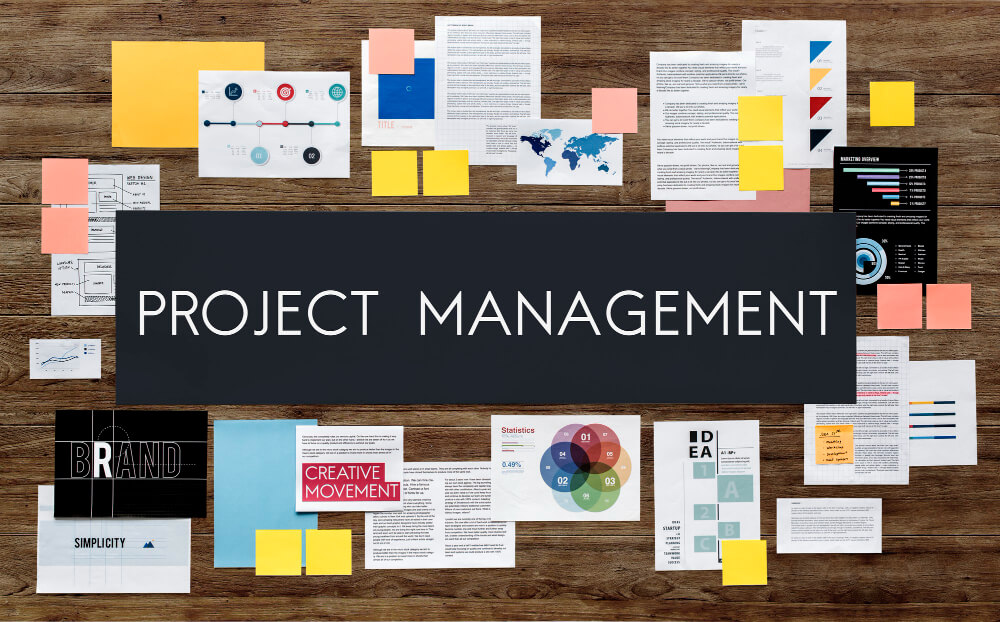Sections of This Topic Include
Foundations of Project Management
- What is Project Management?
- Overviews of Project Management
- Basics of Project Planning
- Roles in Project Management (including Project Manager)
- Skills Required to Leading Teams and People in Project Management
Project Planning
- Feasibility Studies — Is the Project Achievable or Optimised?
- Project Planning — How Do We Determine Project’s Outcomes, Goals and Objectives?
- Project Governance — How Do We Bring Business Level Control to Projects?
- Project Success Criteria — How Do We Leave Everyone in Zero Doubt?
Allocating Project Resources
- Benefits Planning & Realisation — How to Implement This Most Valuable Aspect of Projects.
- Resource Allocation — What Do We Need to Implement the Plan (People, Money and Scheduling)?
Risk Assessment and Ethics Management
- Risk Assessment and Management — What Could Go Wrong?
- Ethics and Projects — Are We In Conformance, Morally and Legally?
Implementing Projects
- Implementation of Project Plan — How Do We Ensure Implementation While Managing Change?
- Communicating Your Plans and Status — What Do We Communicate to Whom and When?
Evaluating Projects
- Earned Value Management — How Do We Measure Progress and Results?
- Evaluating Projects and Results — How Do We Evaluate Implementation and Project Results?
- When Projects Are in Trouble — How Do We Avoid Pitfalls and What Do We Do If They Occur?
General Resources and Topics
- Glossaries of Project Management Terms
- Resources With Many Resources About Project Management
- Software Tools to Do Project Management Process
- Organizations Focused on Project Management
- Getting PMP Certification
- Some Related Fields
Also, consider
FOUNDATIONS OF PROJECT MANAGEMENT
What is Project Management?
Project management is the planning, organizing, and managing of the effort to accomplish a successful project. A project is a one-time activity that produces a specific output and or outcome, for example, a building or a major
new computer system. This is in contrast to a program, (referred to as a ‘program’ in the UK) which is 1) an ongoing process, such as a quality control program, or 2) an activity to manage a number of multiple projects together.
Project management includes developing a project plan, which involves defining and confirming the project goals and objectives, how they will be achieved, identifying tasks and quantifying the resources needed, and determining budgets and timelines for completion. It also includes managing the implementation of the project plan, along with operating regular ‘controls’ to ensure that there is accurate and objective information on ‘performance’ relative to the plan, and the mechanisms to implement recovery actions where necessary.
Projects often follow major phases or stages (with various titles for these), for example feasibility, definition, planning, implementation, evaluation, and realisation. (Thanks for Kevin Lonergan for contributing to this description.)
NOTE: There are many software tools that make project management much more effective and efficient. Software Tools to Do Project Management Process lists software resources. The reader might best be served to read about the overall project management process in the section, “Foundations of Project Management” below, and then review some of the software tools. Another approach is to review the tools as the reader progresses through each phase of the project management process.
Overviews of Project Management
The following links provide an overview of project management:
- Project Management
- Solid Overview of Project Management
- Origins of Modern Day Project Management & Trends in Recent Decades
- Developing a Project Management Best Practice
- Project Management Simply Explained
- Finding Humor in Project Management
- From Project Management to Program Management
- Is PM Just Common Sense?
- Some Project Management Standards and ‘Bodies of Knowledge
- Successful International Projects
- Does It Have To Be So Hard?
- Project Success for the Small Business
- Creating a Successful Project Manager Resume – a Step by Step Guide
Also, consider
Basics of Project Planning
It will benefit the reader immensely to have an understanding of at least the basic planning processes before undertaking the more detailed process of project management. See Basic Guidelines for Successful Planning
Process. Planning is all about asking questions, making decisions and solving problems, so it also will be useful for the reader to have some guidelines for Decision Making and Problem Solving.
There are numerous other topics in the Library that could pertain to project management, but the reader might best be served to first review the resources linked from this topic on Project Management and afterwards see Related
Library Topics.
Some Popular Approaches to Managing Projects
Now that you’ve gained an understanding of the overall project management process, it’s useful to consider how projects could be managed. One traditional approach is to define and deliver your project through distinct phases. Here are two approaches that further enlighten how you might think about managing your projects.
Project management methods fall broadly into two camps: predictive (planned) and iterative (evolving). The most common predictive model is Waterfall and its derivatives and the most common iterative methods follow the principles
of Agile.
Agile Project Management
Agile is not a method – it is an approach (a set of values and principles) covering the development aspect of projects, e.g. software development. When combined with methods (such as Scrum) that support Agile principles, the result is an Agile development process. Agile methods mainly cover the (technical) development activity itself. On many larger projects there are also other elements that need to be managed which Agile methods typically do not cover. These are covered elsewhere in this guide.
- Concise Overview of Agile
- Agile Project Management for IT Projects (a book chapter)
- Comparison of Agile and Waterfall
- Agile Management (an approach to management)
- Decomposition of Projects: How to Design Small Incremental Steps
- Agile Project Management
- Agile Reporting from Waterfalls
A number of development methods match the principles of Agile. They address elements of the development activity (e.g. software development) and most do not address aspects outside of the core development activity. Therefore on larger projects, many Agile methods will not cover all that has to be done. It will still be necessary to plan and manage those elements.
Some Examples of Agile Methods:
- Scrum: in under 10 Minutes
- Extreme programming (XP): Guidance and references
- Kanban: in Under 5 Minutes
- DSDM: What is DSDM?
- Test Driven Development:
- Agile project management: 12 key principles, 4 big hurdles
Prince2
Prince2 originated in the 1990s as the UK Government’s method for managing IT projects. Since then authors have worked to broaden its applicability. It is primarily a framework for defining and delivering projects that focuses mainly on Governance. As with Agile, it does not cover many other core elements of managing projects, such as many of those covered in ‘Doing project management’ on this page.
- Overview of Prince2
- The PRINCE2 Training Manual
- PRojects IN Controlled Environments (a.k.a. PRINCE2®)
- PRINCE2: The Most Popular PM Exam In The World – Guest Post by Simon Buehring
Project Management ‘Bodies of Knowledge
A number of the more mature Professional Associations have published their own Body of Knowledge (BoK) covering project management. These are not methodologies in themselves, but do describe processes and skills or competencies associated with project management. PM Certification examinations such as PMP or APMP are based on their relevant BoK. The most popular are:
Roles in Project Management (including Project Manager)
- Project Roles and Responsibilities
- Role of the Project Manager
- Real Example of Lessons Learned on Project Manager Responsibilities
- In-House Project Managers vs. External
- The Role (and Challenge) of the Project Sponsor
- Top 10 Leadership Qualities of a Project Manager
- Maximizing Project Managers
- How Bad Project Managers are Killing the Profession
- Making Junior Project Managers More Senior
- Managing Projects on a Global Scale
- 12 Essential Soft Skills for Project Managers
- Seven Deadly Project Manager Sins
- On the importance of field knowledge in project management
- Who s The Boss?
- Where Can a Project Manager Go From Here?
- The Trouble With Sponsors
Skills to Lead Teams and People in Project Management
(adsbygoogle = window.adsbygoogle || []).push({});
There are certain skills to have when conducting project management. It’s best to have a team of planners when doing project planning. Therefore, it’s important to have skills in forming, leading and facilitating groups. The following information will help you develop these skills.
- Yes, Project Managers Need Leadership Skills!
- Kicking Off the Project Team
- Team Building
- Leadership (Introduction)
- Meeting Management
- Short Video on What Makes a Great Project Manager
- Facilitating in Face-to-Face Groups
- Group-Based Problem Solving and Decision Making
- Conflict Management (this topic provides basics in managing conflict in groups)
- Capturing Lessons Learning During Projects
- Using Project Teams on Organizational Projects
- Project Management, Leadership and Making the Right Decision
- A Strategic Management Model that Works
- Course 19: Managing Projects
- Become a Project Management Minimalist — Video 1
- 10 Steps to Project Success
- On the importance of field knowledge in project management
- 5 Leadership Skills for Project Managers
- How Project Managers Can Manage Conflict
- Project With China
- Cultures in the Project
- How to Onboard Project Resources
- Successful Strategies for Global Projects
(adsbygoogle = window.adsbygoogle || []).push({});
PROJECT PLANNING
Feasibility Studies — Is your Project Viable or Optimised?
A feasibility study determines if a project is viable or tests the pros and cons of different technical strategies and solutions.
- Feasibility Studies
- How to Develop a Prototype
- Have Your Project Demo Ready
- So Are We Doing This?
- Are We All Here?
- Is It a Project or an Operation?
- Is Your Project Really Worth It?
Project Planning — How Do We Determine Project Outcomes, Goals and Objectives?
Overview of Project Planning
Project planning includes agreeing on the overall goals to be achieved by the project, the objectives associated with each goal, and responsibilities to achieve each objective. Planning might also include specifying milestones or deliverables to be produced, and timelines for achieving the objectives and milestones.
- Project Planning A Step-by-Step Guide
- Steps in Project Planning
- Project Management Planning
- How to Plan Any Project
- Assumptions When We Plan and Define Projects
- Planning a Project — Sample Project Plans
- Planning a Project — the Basics
- How to Use Software to Plan and Prioritize Projects
- Putting a people focus into project management
- Project Management Definition and Solutions
- Avoid That Creep
- How Many Trackers Do You Track?
- The Pareto Thing
- My Own Moving Country Project
- Centralizing Your Project Portfolio
Project Governance
Covers responsibilities for key decisions and may also cover business level reviews of strategic projects:
Project Success Criteria
It can be fundamentally useful to define crystal clear success criteria for any project, to avoid the real risk of anyone making incorrect assumptions on such an important matter.
Benefits Planning and Realisation
A new topic that has developed from the UK since 2000. For any organisation involved in a business improvement or change project, this is the most valuable and important task they will do.
When Working from Requirements
Some projects do planning by working from an initial set of project requirements. The requirements might have come from other stakeholders, or people who have a strong interest in the project and/or will be affected by the project.
- Income: International Council on Systems Engineering - defining customer needs and requirements in (project) systems
- Overview of requirements management by UK’s Office of Government & Commerce
- Open Architecture Requirements Management
- Building a Requirements Document
Some Tools for Project Planning
- Generic Project Proposal Template
- Project Evaluation and Review Technique
- Statement of Work
- Project Charter
- How to Create a Work Breakdown Structure
- Dependency Structure Matrix
- RAID or Not to Raid
Program Evaluation and Review Technique (PERT) - A scheduling Technique
- Program Evaluation and Review Technique (PERT)
- How to Use a PERT Chart for Project Management
- User-Friendly Handbook for Project Evaluation
Resource Allocation — What Do We Need to Implement Project Plan (People, Money, Scheduling)?
Resource allocation identifies the resources needed and schedules their involvement. It might also consider the efficient integration of those resources and do contingency planning in case certain resources are not sufficient or available. Some planners might include budgeting as part of the resource allocation process.
- Resource Allocation
- Splitting a Project Into Small Bits
- Estimating Project Costs
- Hierarchy of Project Objectives
- Resource Leveling
- Are Sub-Contractors Good Or Bad?
- Five Techniques So You Don’t Have To Be There
- How to Manage Your Time as a Project Manager
- The Perception of Time
- Good, Cheap and Fast! You’ve Got to Be Joking!
- How to Manage Your Time as a Project Manager
Some Tools for Resource Allocation
(adsbygoogle = window.adsbygoogle || []).push({});
RISK ASSESSMENT AND ETHICS MANAGEMENT
Management of Project Risk — What Could Go Wrong?
Risk management involves identifying potential risks in a project and how to mitigate or manage each. It’s always best if risks are identified using a comprehensive and systematic approach.
- Project Risk Management Principles
- Improving Project Risk Management
- 10 Golden Rules of Project Risk Management
- Project Management: Risk Management
- What is Risk Management in Project Management?
- Risky Business
- Are Issues Risks?
Some Tools for Risk Management
Ethical Analysis of Project — Are We In Conformance, Morally?
Ethics is clarifying what’s morally right and wrong, and influencing that actions are morally right. Ethics can include codes of ethics, codes of conduct, guidelines to resolve ethical dilemmas and training about these ethics tools. Ethics applies in all aspects of project management.
- Business Ethics
- Ethics in Project Management
- Ethics in Project Management Customers and Suppliers?
- PMI’s Code of Ethics and Professional Conduct
- Project Management Ethics and Rules of Conduct
- Green Project Management
IMPLEMENTING PROJECTS
Implementation of Project Plan - How Do We Ensure Implementation, While Managing Change?
To Ensure the Implementation of the Project Plan
The best practices to ensure implementation of the plan actually start early in the planning process. The practices are the same, whether for strategic, business or project planning.
To Manage Change During the Implementation of the Project Plan
Implementation of important plans, such as strategic, business and project plans, usually impact the strategy, structure and/or operations of the organization. Therefore, it’s important that project managers understand at least some basics about managing change in organizations.
Communication and Your Project – Communication is the Life-Blood of Projects:
It’s extremely important to communicate project plans, status and results to stakeholders. Many project managers would agree that this is one of the biggest problems in project management.
- Project Communication
- Methods for Distributing Information on Projects
- Real-World Project Communications
- If It s Important, Less Is More
- Inside Technical Specifications
Some Tools for Communicating Project Plans and Status
EVALUATING PROJECTS
Earned Value Management – How to Objectively Measure Schedule and Budget ‘Performance’
Earned value management provides objective measures of schedule and budget performance during implementation. When done comprehensively and systematically, it will provide early detection of schedule or budget problems.
- What is Earned Value?
- An Overview of Earned Value Management
- Earned Value Management
- Glossary of EVM Terms
Some Tools for Project Management
- Program Evaluation and Review Technique (PERT)
- How to Use a PERT Chart for Project Management
- Critical Path Method
Evaluating Projects and Results – How Do We Evaluate Implementation and Project
Results?
Project evaluation is done during project implementation and after completion in order to assess the quality of activities and achievement of results.
- Project Management Evaluation
- Methods for Evaluating Project Performance
- An Objective Method for Evaluating Project Managers’ Performance
- Systematic Planning and Evaluating the Project Management Effort
- Using Return on Investment to Evaluate Project Management Training
- About Project Quality
- User-Friendly Handbook for Project Evaluation
- How Many Trackers Do You Track?
Program Evaluation and Review Technique (PERT)
- Program Evaluation and Review Technique (PERT)
- How to Use a PERT Chart for Project Management
- User-Friendly Handbook for Project Evaluation
When Projects Are in Trouble — Most Common Issues and What Do We Do If They Occur?
- Why Does Project Management Fail in Some Companies?
- Pragmatic Project Management Requires Focus to Avoid Creep
- Project Pitfalls from Symptoms to Solution
- One Project – Multiple Consulting and Freelance Clients
- Top 10 Issues for Project Managers
- Reasons Why Projects Fail
- Project Management, initiative, leadership: How to Avoid a Work Burnout
- 5 Strategies for Dealing with Project Management Chaos
- The Project Management Office Blues
- Exit Stage Left
- TheTrouble With Troubled Projects
GENERAL RESOURCES AND TOPICS
Glossaries of Project Management Terms
- Project Management Glossary
- A Project Management Glossary
- PM Forum’s Glossary
- Wideman Comparative Glossary of Project Management Terms)
- It Depends On What the Meaning of “Is” Is
- Three Critical Project Management Terms to Know
Further Sites With Many Resources About Project Management
- Free Project Management Articles published weekly
- PM Forum Library
- Project Management Tools
- Tutorials Point
- The Manager.org
Software Tools to Do Project Management Process
- How To Find The Right Project Management Software For Your Needs
- 10 Free Tools for Effective Project Management
- Process Templates and Tools
- Project Management and Tools Directory
- How to Use Software to Plan and Prioritize Projects
- Exotic Project Management Software
Professional Bodies Focused on Project Management
- International Project Management Association
- Project Management Institute(PMI)
- UK Association of Project Management (APM)
- Project Management Organizations and Resources
Getting PMP Certification
- Getting the PMP Certification
- Project Management Certification and Training
- PMP Certification Guide – Online PMP Certification Training
- Project Management Certification Just Got Easier
- PRINCE2: The Most Popular PM Exam In The World – Guest Post by Simon Buehring
Some Related Fields
Learn More in the Library’s Blogs Related to This Topic
In addition to the articles on this current page, see the following blogs which have posts related to this topic. Scan down the blog’s page to see various posts. Also see the section “Recent Blog Posts” in the sidebar of the blog or click on “Next” near the bottom of a post in the blog.
- Library’s Business Planning Blog
- Library’s Building a Business Blog
- Library’s Leadership Blog
- Library’s Project Management Blog
- Library’s Strategic Planning Blog
- Library’s Supervision Blog
For the Category of Planning and Project Management:
To round out your knowledge of this Library topic, you may want to review some related topics, available from the link below. Each of the related topics includes free, online resources. Also, scan the Recommended Books listed below. They have been selected for their relevance and highly practical nature.
Related Library Topics
 Sections of this topic
Sections of this topic
















